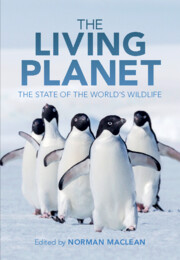Book contents
- The Living Planet
- The Living Planet
- Copyright page
- Contents
- Contributors
- Preface
- Acknowledgements
- One Introduction and the Evolution of Life on Earth
- Two Flowering Plants
- Three Bryophytes and Pteridophytes: Spore-Bearing Land Plants
- Four Terrestrial Mammals
- Five Marine Mammals: Exploited for Millennia, But Still Holding On
- Six How Birds Reveal the Scale of the Biodiversity Crisis
- Seven Reptiles
- Eight Amphibians
- Nine Freshwater Fishes: Threatened Species and Threatened Waters on a Global Scale
- Ten The Amazing Yet Threatened World of Marine Fishes
- Eleven Insects
- Twelve Marine Invertebrates
- Thirteen Non-Insect Terrestrial Arthropods
- Fourteen Terrestrial Invertebrates Other Than Arthropods and Molluscs
- Fifteen Non-Marine Molluscs
- Sixteen An Account of the Diversity and Conservation of Fungi and Their Close Relatives
- Seventeen Simple Life Forms
- Eighteen Assessing Species Conservation Status: The IUCN Red List and Green Status of Species
- Nineteen Problems with the World’s Ecosystems: The Future and Attempts to Mitigate Decline
- Twenty Conservation Methods and Successes
- Twenty One What Does the Future Hold for Our Planet and its Wildlife?
- Species Index
- Subject Index
- References
Twenty One - What Does the Future Hold for Our Planet and its Wildlife?
Published online by Cambridge University Press: 13 April 2023
- The Living Planet
- The Living Planet
- Copyright page
- Contents
- Contributors
- Preface
- Acknowledgements
- One Introduction and the Evolution of Life on Earth
- Two Flowering Plants
- Three Bryophytes and Pteridophytes: Spore-Bearing Land Plants
- Four Terrestrial Mammals
- Five Marine Mammals: Exploited for Millennia, But Still Holding On
- Six How Birds Reveal the Scale of the Biodiversity Crisis
- Seven Reptiles
- Eight Amphibians
- Nine Freshwater Fishes: Threatened Species and Threatened Waters on a Global Scale
- Ten The Amazing Yet Threatened World of Marine Fishes
- Eleven Insects
- Twelve Marine Invertebrates
- Thirteen Non-Insect Terrestrial Arthropods
- Fourteen Terrestrial Invertebrates Other Than Arthropods and Molluscs
- Fifteen Non-Marine Molluscs
- Sixteen An Account of the Diversity and Conservation of Fungi and Their Close Relatives
- Seventeen Simple Life Forms
- Eighteen Assessing Species Conservation Status: The IUCN Red List and Green Status of Species
- Nineteen Problems with the World’s Ecosystems: The Future and Attempts to Mitigate Decline
- Twenty Conservation Methods and Successes
- Twenty One What Does the Future Hold for Our Planet and its Wildlife?
- Species Index
- Subject Index
- References
Summary
This chapter will attempt to predict what the future will hold for life on Planet Earth. It reviews the changes which have come about and which will continue as a result of factors such as climate change. The chapter also discusses the emergence of the Extinction Rebellion movement, the likely future declines in insects and other species, as discussed in the 2019 State of Nature report, and the factors that are likely to continue to impact survival of wild species on Planet Earth. In closing, the chapter outlines some likely future increases in species adapting to life in large cities.
- Type
- Chapter
- Information
- The Living PlanetThe State of the World's Wildlife, pp. 379 - 387Publisher: Cambridge University PressPrint publication year: 2023

